FEEDING THE PLANET
‘Billions are hungry and undernourished’ – UN summit repeats call for urgent action on world’s food systems
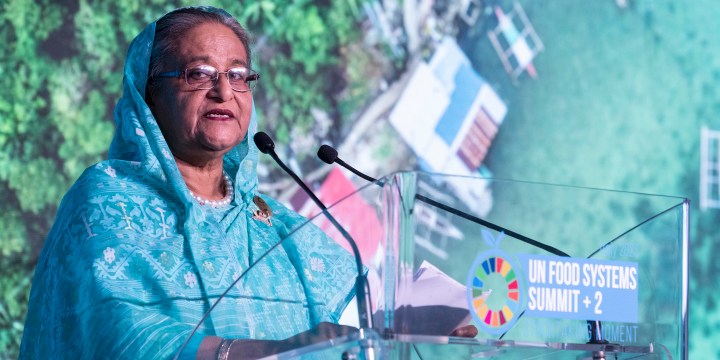
The United Nations Food Systems Summit in Rome this week is trying to get the world to understand that food systems have the potential to turn around some of the biggest problems humanity and the planet are experiencing as a result of human actions: hunger, climate change, biodiversity loss and malnutrition in all its forms.
Rome, Italy – As Russia withdrew from the Black Sea Initiative enabling vital Ukrainian grain exports, as climate change-driven wildfires raged in Greece and as southern Italy sweltered in a hotter-than-usual late-July heatwave, the United Nations’ Food Systems Summit 2023 burned with its own sense of urgency to make changes in our food systems that have the potential to solve food insecurity and climate change.
“This is a gathering about food systems,” UN secretary-general António Guterres said at the start of his speech which opened the summit on 24 July, “but it is essentially about the people in it, and to fulfil the most basic of human rights: the right to food. In a world of plenty, it is outrageous that people continue to suffer and die from hunger. The first summit helped shine a spotlight on a core truth: global food systems are broken, and billions of people are paying the price.”
The concept of “food systems” – taking a holistic “systems” approach to food production, consumption, waste and all their impacts on humanity, on biodiversity and on the climate – is relatively new. Historically countries have focused on agricultural output as a measurement of how well they are doing to ensure food security. But the food-systems view of all the inputs, costs and knock-on effects that producing, processing, selling, consuming and wasting food have – especially in light of the climate crisis and renewed food insecurity for hundreds of millions since the Covid-19 pandemic and Russia’s war in Ukraine – has begun to move towards centre stage in global geopolitics.
Guterres cited now-familiar figures: More than 780 million people go hungry while one-third of all food produced is lost or wasted. More than three billion people cannot afford healthy diets, while two billion are overweight or obese and 462 million are underweight.
At the same time, developing countries struggling under huge debt burdens can’t afford to reach everyone who needs the nutrition they need to live healthy lives, and unsustainable food production, packaging and consumption are “feeding the climate crisis”, generating one-third of all greenhouse gas emissions, using 70% of the world’s freshwater and driving biodiversity loss.
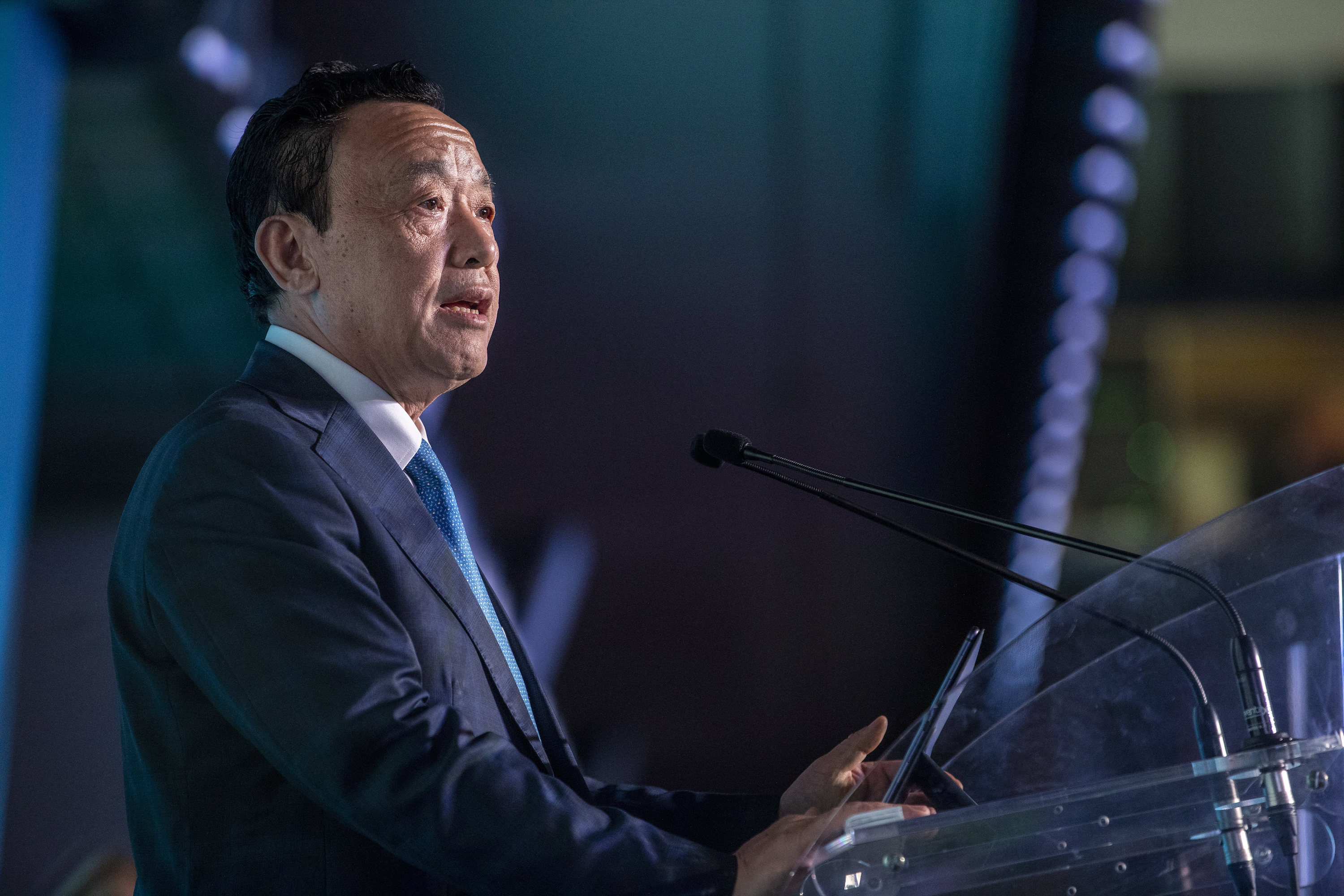
FAO director-general Qu Dongyu at the official opening of the UN Food Systems Stocktaking Moment at the Food Systems Summit in Rome on 24 July 2023. (Photo: ©FAO / Giulio Napolitano)
Tracking progress
This summit, called UNFSS+2, held in Rome at the headquarters of the UN’s Food and Agriculture Organization (FAO) from 24 to 26 July, is called “the Stocktaking Moment” and may just be the actions-focused type of UN meeting the world needs more of.
The conference, with 2,000 participants from more than 160 countries, is attempting to take the temperature of how far the world has come in making meaningful changes to food systems at global, national and local levels since the first such summit in 2021, which set up the idea that not just governments but the private sector, all other sectors, communities and all members of society need to work together to create food-systems transformation.
The first UN Food Systems Summit, held virtually in 2021 but led from UN headquarters in New York, did not result in agreement among countries on how to track progress in improving national and global food systems, though it led to the creation of such a system.
It kicked off the Food Systems Countdown Initiative (FSCI), which uses 50 specific indicators, counting down to 2030, to monitor how countries are doing according to goals they have set themselves for food-system transformation. In short, said Lawrence Haddad, executive director of the Global Alliance on Improved Nutrition (GAIN), the FSCI gives countries a framework with “actionable indicators” that can be modified for country-specific needs, and which form “a feasible starting point for monitoring at a global level and complement[ing] other frameworks for environment-related goals”.
Read more in Daily Maverick: Community food systems can help alleviate the scourge of hunger, say activists
The summit’s opening ceremony began with speeches from Guterres, Italian Prime Minister Giorgia Meloni, Italy’s Minister of Foreign Affairs Antonio Tajani, as well as the prime ministers of Ethiopia (Abih Ahmed), Bangladesh (Sheik Hasina), Samoa (Fiame Naomi Mataafa), Nepal (Pushpa Kamal Dahal), and the director-general of the FAO, Qu Dongyu.
Other participants in the session’s panel discussions included UN deputy secretary-general Amina Mohammed, World Food Programme executive director Cindy McCain, CEO of Save the Children International Inger Ashing and David Nabarro, co-lead of the UN’s Global Crisis Response Group.
“Broken food systems are not inevitable,” Guterres said, “they are the result of choices we have made, and there is more than enough food to go around, more than enough money… to feed the world while sustaining decent work for those who grow the food we eat.”
‘Urgent traction’ needed in three areas
The world needs “urgent traction” in three key areas, he said, framing food systems transformation as an accelerator in achieving all 17 Sustainable Development Goals by 2030 – not just SDG 2, which aims to “end hunger, achieve food security and improved nutrition and promote sustainable agriculture”. (Of the 140 targets across the 17 SDGs for which there are data, only about 15% are on track, half are “moderately or severely off track” and 30% have either not moved at all or have regressed.)
$400-billion will be needed every year to transform global food systems, while doing nothing could cost $12-trillion.
First on Guterres’s shortlist was “massive investment in sustainable, equitable and resilient food systems”, meaning making available affordable financing for food systems reform (including but not limited to agricultural activities), urging governments to scale up “affordable long-term financing for all countries in need” to at least $500-billion per year.
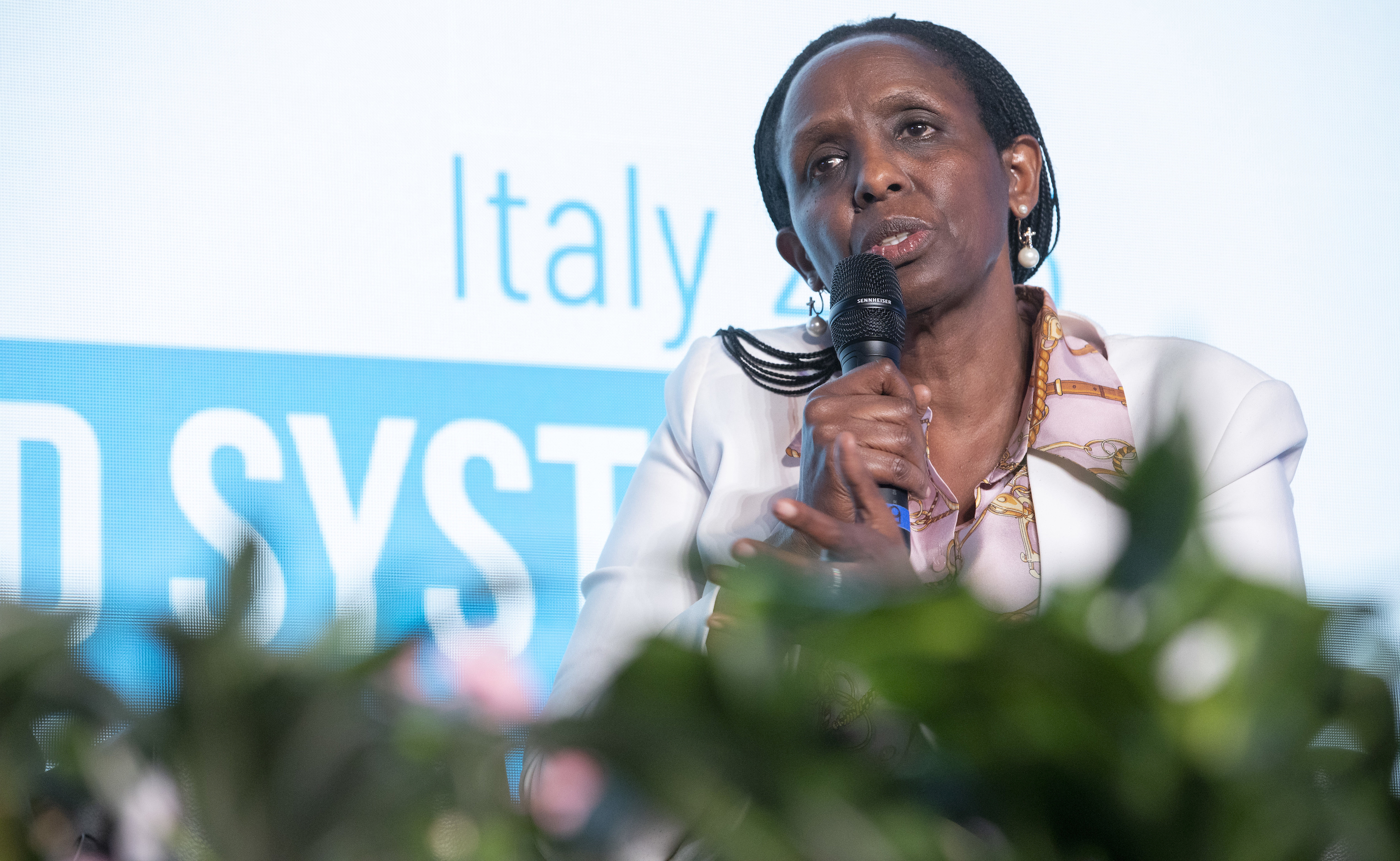
Agnes Kalibata, president of the Alliance for a Green Revolution in Africa and former special envoy for the 2021 Food Systems Summit, at UNFSS+2. (Photo: ©FAO / Giulio Napolitan)
Second, governments and business must work together “to put people over profit”. This would include finding ways to lower cost (to the consumer), increase geographic availability of food, remove trade restrictions and expand the reach of technological innovation to increase the efficiency of food systems, which represent 10% of the global economy.
Third, “we need food systems that can help end the senseless war on our planet,” Guterres said, referring to the human-driven climate crisis.
Read more in Daily Maverick: A ‘just transition’ cannot happen without making food production and consumption more accessible and affordable
Guterres said that “the dire picture has grown bleaker” with Russia’s termination of the Black Sea Initiative that enabled the safe export of more than 32 million metric tonnes of grains and oil seeds on more than 1,000 vessels from Ukrainian ports, to developing countries that rely on those exports for their staple foods.
But Guterres also reported good news, “that countries are heeding the alarm we sounded in 2021” noting that since the first summit more than 100 countries have submitted progress reports to the FAO. Still, “rescuing” the Sustainable Development Goals “means going much further, and time is running out”.
Alvaro Lario, the president of the UN’s agricultural development fund, said that $400-billion would be needed every year to transform global food systems, while doing nothing could cost $12-trillion.
“The cost of inaction is much higher than the cost of action. If we really want to take people out of hunger, out of poverty, we need investments, not only (humanitarian) assistance. And those investments need to be very much focused on pro-poor rural policies.”
Major themes
On the first of the summit’s three days consisting of nine plenary sessions, 10 “leadership dialogues”, 14 “special events” (from “The True Cost of Food” to “Blue Transformations”, on aquatic food systems, at which South Africa’s ambassador to Italy, Nosipho Nausca-Jean Jezile, made a statement) and 40 “side-events”, several big themes emerged early.
“If you can’t count, you don’t count,” said Agnes Kalibata, former UN special envoy on food systems and now president of the Alliance for Green Revolution in Africa, emphasising how seriously we need to take the importance of data and the importance of investing in data gathering and improving data quality for food systems – especially in Africa.
“The role of data,” she said, “is to help us understand the type of policies we make and how we work together on them.” (Another choice phrase that came out of a separate session on measuring food systems transformation was “if you can’t measure it, you can’t manage it”.

Sheikh Hasina, prime minister of Bangladesh, at the UN Food Systems Summit +2. (Photo: ©FAO / Giulio Napolitano)
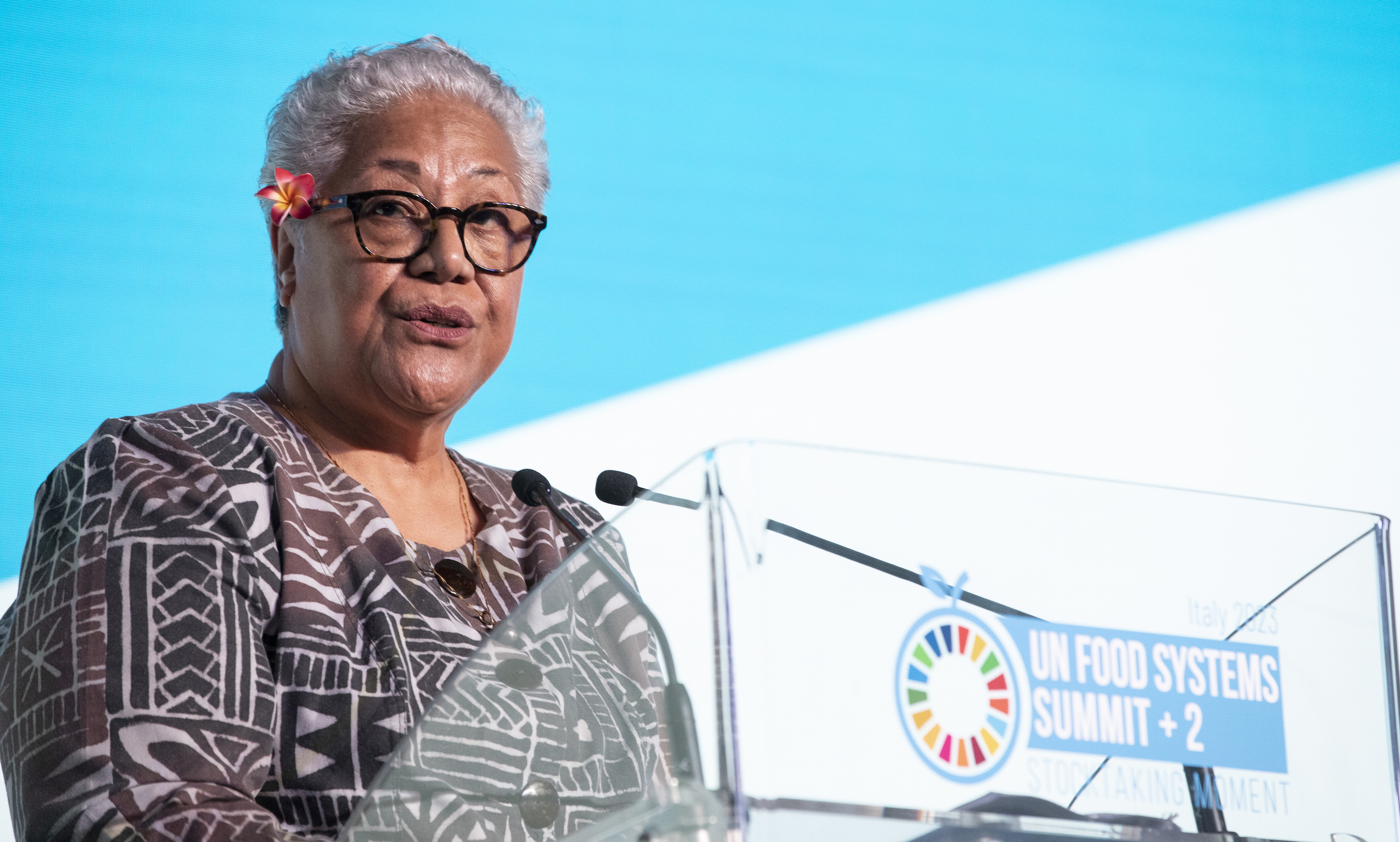
Samoan Prime Minister Fiame Naomi Mataafa at the official opening of the UN Food Systems Stocktaking Moment. (Photo: ©FAO / Giulio Napolitano)
Other big ideas raised by many participants independently were that farmers’ on-the-ground experiences, expertise and solutions are integral to the design of effective solutions for agricultural problems, especially for smallholder and subsistence farmers; that women are major drivers and influencers within food systems; that young people need to be more actively brought in, given a voice and given leadership in food systems work, and that cities are increasingly powerful as food system actors and can play major roles in reducing climate impacts and biodiversity loss.
We need the right data – without data we just have opinions. If we can’t measure things, we don’t know if we’re achieving the vision.
Kalibata also crystallised another big idea coming out of the summit: agreement among countries on what taking a “food systems” approach actually means. “If we can be clear on [that], then we have an agenda,” she said while strongly emphasising the necessity to track progress.
“If we have mechanisms to track progress, we can make sure that each of 126 countries [that have each submitted a “Pathways to Sustainable Food Systems”] can show and hold each other accountable. But importantly we need to make sure we are working with the private sector,” she said, also underscoring the need for integration of food systems into COP28, the next global summit on climate change (so far, the climate-related COP – for the past 27 years – has not included food as a main agenda item).
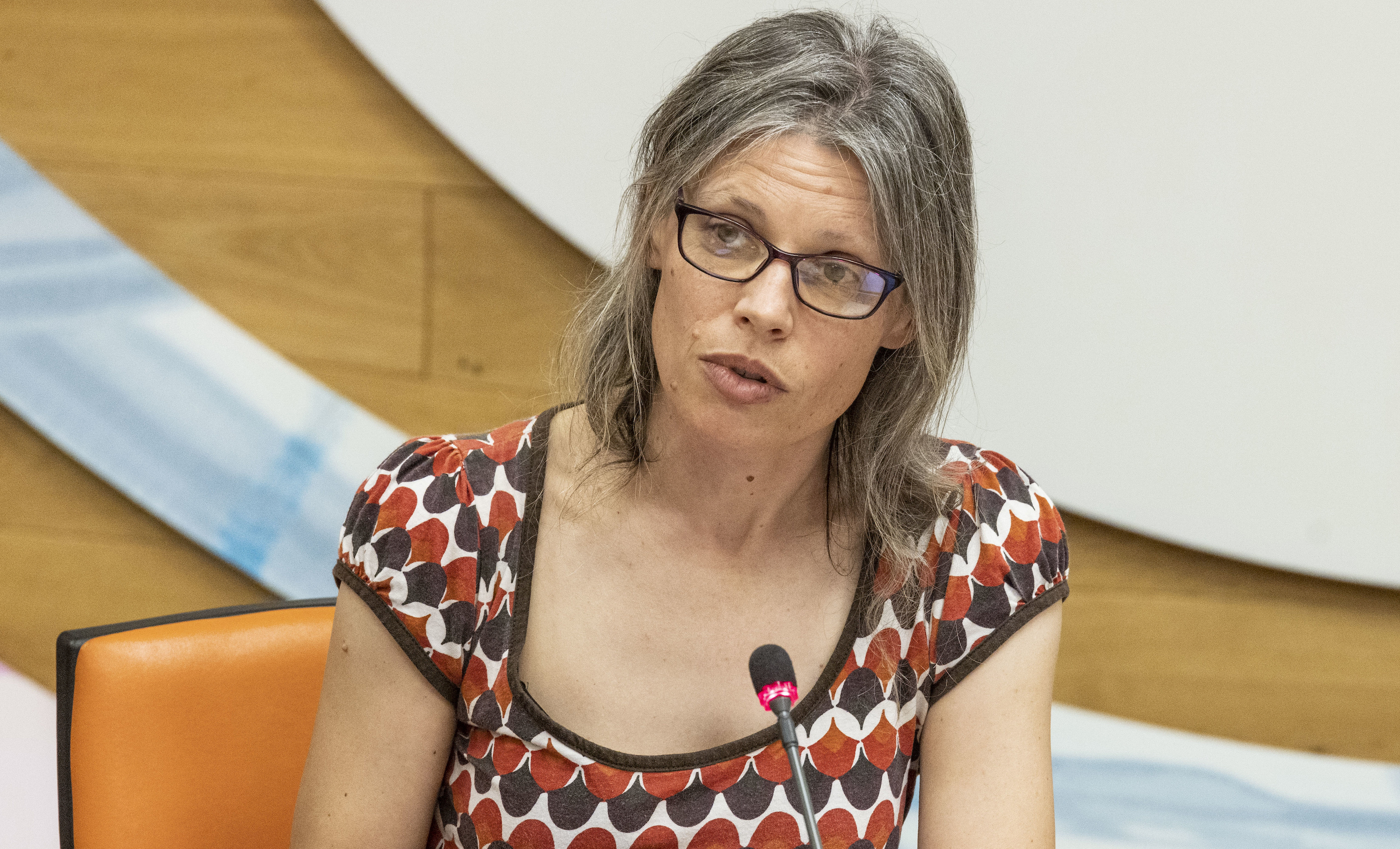
Jane Battersby from the University of Cape Town at a side-event on ‘city, subnational and national governments join actions with multiple actors towards healthy, inclusive, sustainable, and resilient food systems’. (Photo: ©FAO / Riccardo De Luca)
Cindy McCain, executive director of the World Food Programme, stressed the need for the private sector to come to the table, while others in separate sessions urged countries and the private sector to do “true cost accounting” for food (that is, in addition to the financial costs, taking into account the environmental, health and social costs).
Moderating a panel on measuring food-systems’ transformation with speakers from Bangladesh, Ethiopia, Mexico and Switzerland, GAIN’s Haddad asked the obvious question: “Why do we need data? We all keep saying we want to transform food systems, but how do we know if we’re doing it? We need the right data – without data we just have opinions. If we can’t measure things, we don’t know if we’re achieving the vision.”
The emphasis on people, especially the poor, was as strong as that on data and measurement.
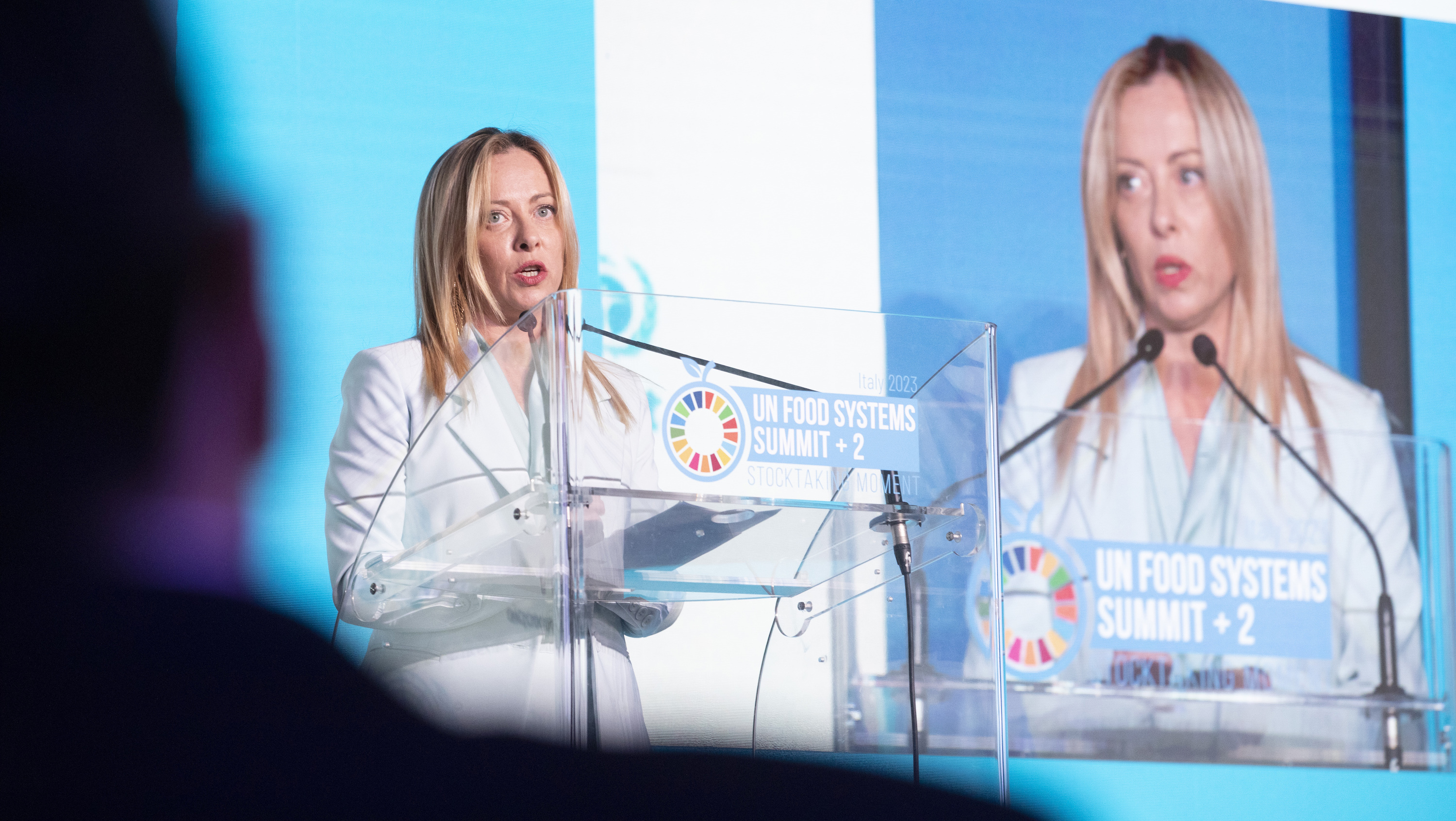
Italian Prime Minister Giorgia Meloni at the UN Food Systems Summit +2 Stocktaking Moment in Rome on 24 July 2023. (Photo: ©FAO / Giulio Napolitano)
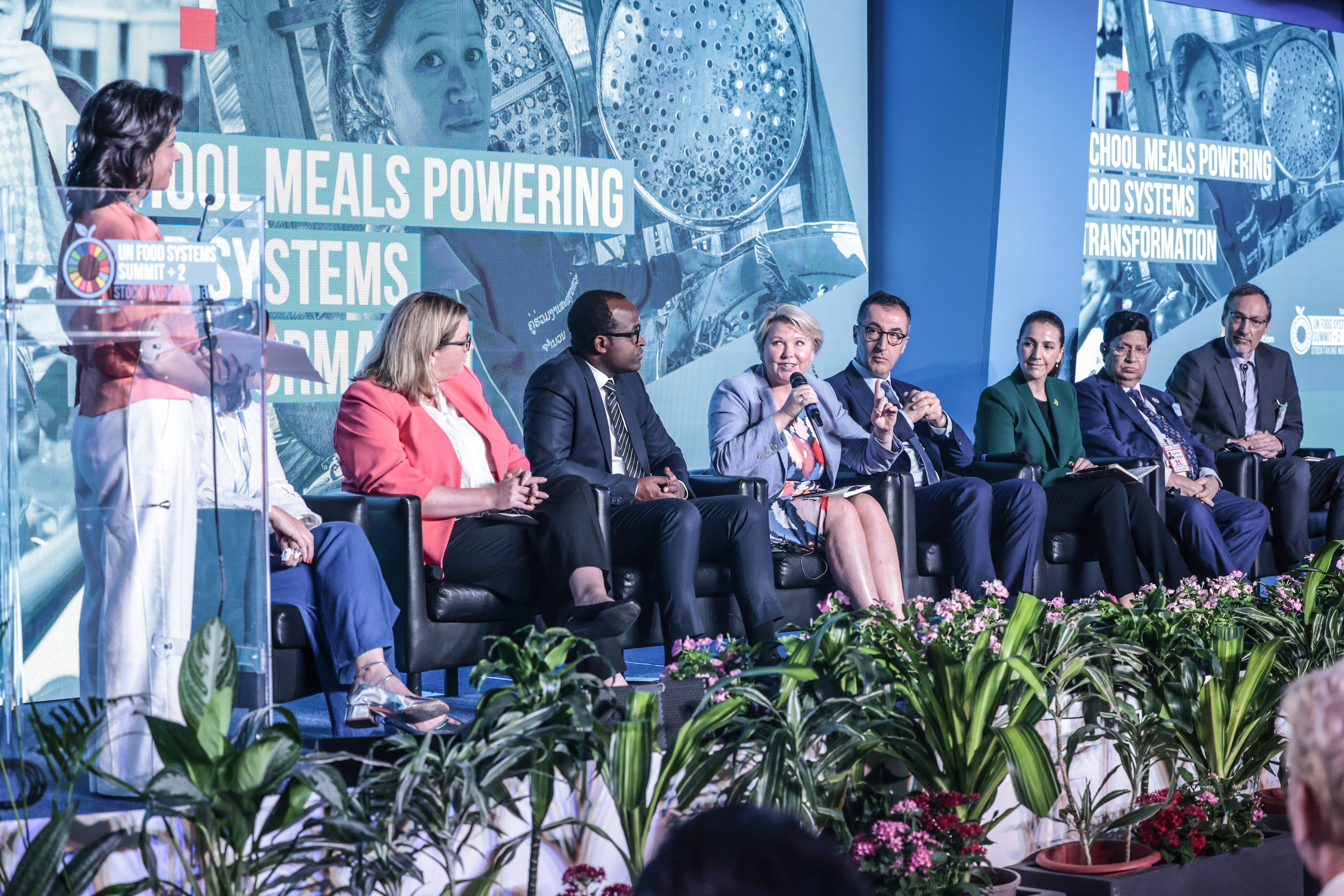
The Plenary Session: School Meals Powering Food System Transformation at the UN Food Systems Summit +2 Stocktaking Moment on 24 July 2023. (Photo: ©FAO / Cristiano Minichiello)
Kalibata echoed plainly what several other participants voiced in the course of the day: “All of [this] is not going to work if food systems are not working for the poor. And financing today is not working for poor communities, countries, for adaptation.”
She was one of many issuing a clarion call for a change in how financing institutions invest in developing countries, whose debt burdens prevent them from accessing further funding for agricultural and other food systems infrastructure and development. “It’s really critical that we work with countries struggling with debt,” she said, stressing the need for countries to be able to attract resources and to work together. “The opportunity is there. We need to harness it.”
South Africa’s participation at an official level at UNFSS+2 was limited to the ambassador’s statement in the “Blue Transformation” session on 25 July. The 400-word statement focused on aquaculture and did not address the bigger picture of South Africa’s food security or food systems issues, pointing out that the government has a strategic partnership with FAO to develop the aquaculture sector in the country and the region, and that it has identified aquaculture as a potential contributor to food security and nutrition, poverty alleviation, women and youth empowerment and advancing environmental sustainability to prevent overexploitation of wild-capture fisheries. DM
Notes:
The UNFSS+2 programme can be found on the UN Food Systems Coordination Hub. The summit video recordings can be viewed at the UNFSS+2 Virtual Campus.




















 Become an Insider
Become an Insider
Comments - Please login in order to comment.